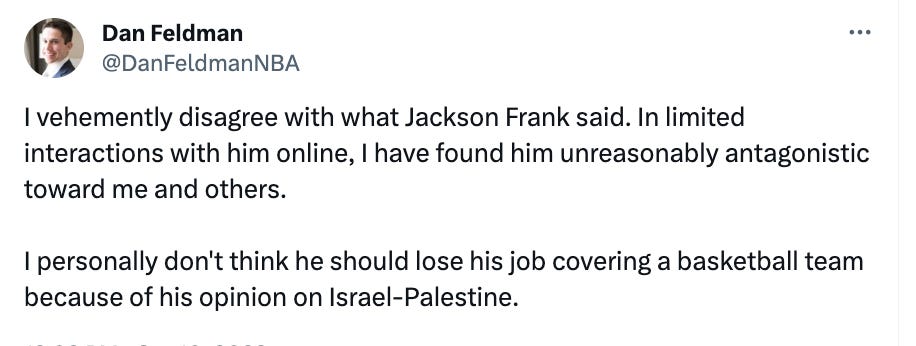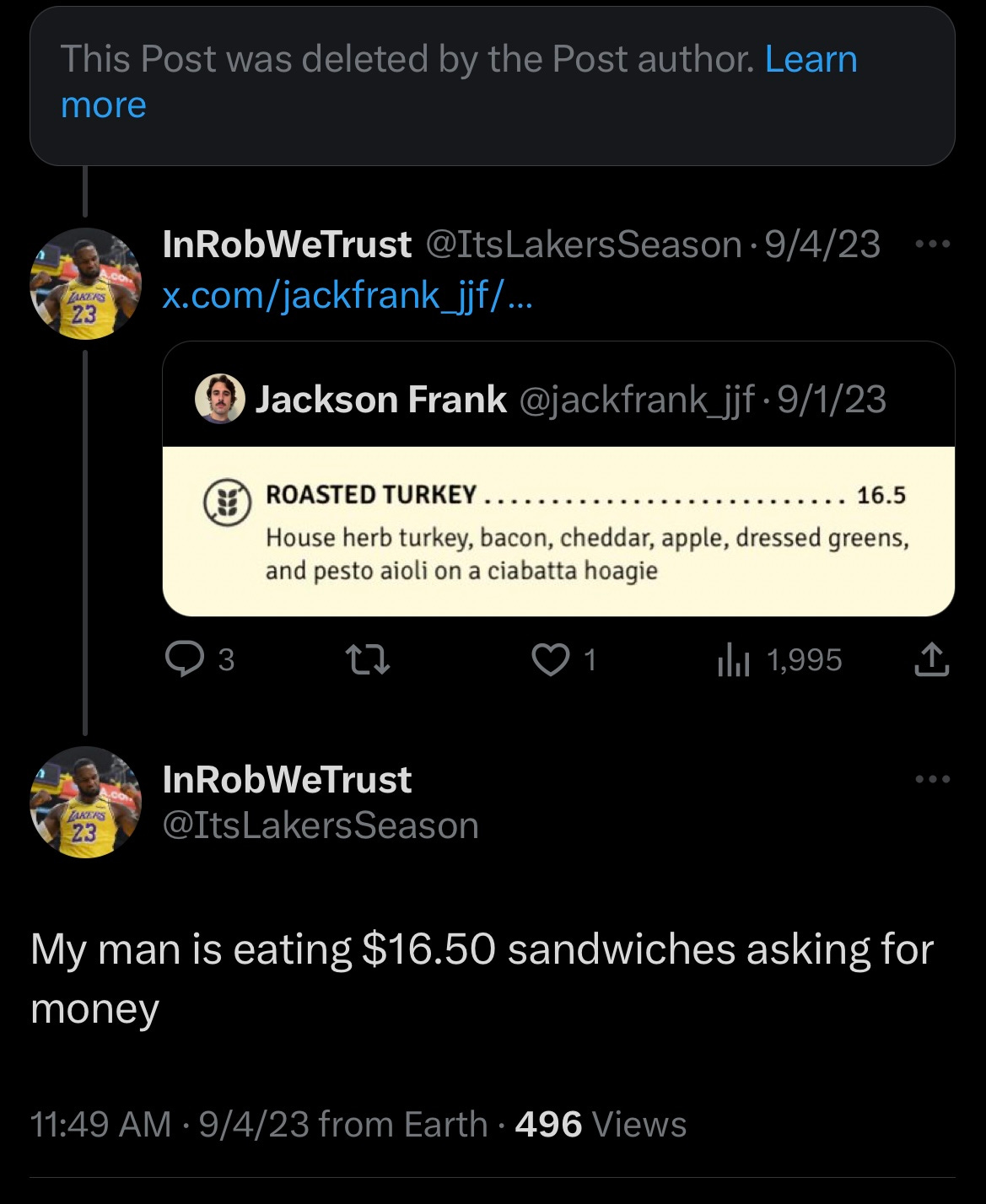Why the Next Generation of Sports Writers Isn't Coming
Plus why a guy got fired in reaction to his Israel tweet
“Twitter doesn’t do anything except get you in trouble. Dude, if you got fired because of Twitter, first of all, you’d feel like the dumbest motherfucker to ever walk the face of the earth, and you would be right. You would have killed the golden goose for nothing. For trying to be funny.” — Wright Thompson
When ESPN’s Wright Thompson said that back in 2017, it made me laugh. Now, I think a lot of people in sports media might look at the above quote and think, “What golden goose”?
In real time, Katie Herzog and I ruled on the fairness of a newly hired 76ers beat reporter getting fired over one tweet on October 9th. It occurs to me, looking back, that there’s more to say on this very stupid controversy about a very serious situation.
Here’s what happened. The 76ers’ team account tweeted, in response to the surprise 10/7 massacre of over 1,300 Israeli citizens, “We stand with the people of Israel and join them in mourning the hundreds of innocent lives lost to terrorism at the hands of Hamas #StandWithIsrael.” Now-former Philly Voice 76ers beat reporter Jackson Frank quote tweeted, in response, “This post sucks! Solidarity with Palestine always.”
I’m tempted to play the role of free-speech maximalist here, because no, I don’t want people fired over dumb tweets. Additionally, I don’t think someone should be fired simply over expressing solidarity with Palestine, even if reflexive solidarity might be taken as intemperate in the immediate aftermath of Hamas unleashing a civilian massacre. Israel is waging war in response to the attack and a lot of people will die. It’d be totalitarian for all this to play out without a common allowance for open criticism. Whether it’s Ukraine, Israel, or any other country, an American shouldn’t be compelled to lockstep support whatever your nation’s ally is doing.
That said, I think this tweet is fireable due to my own status as a member of an identity group: Beat writer.
It is due to my identity that I am in complete disagreement with NBA analyst Dan Feldman on the matter, even if I believe his take to be indicative of what an honorable guy he is.
Dan is wrong. Principled, generous, but wrong. Fair or unfair, I chalk it up to Dan never having been a beat writer, the job where you follow a team around and report exclusively on it. Having been a beat reporter, I can’t imagine tweeting “This post sucks!” at the account of the team I’m covering, like all of life is one big subreddit. I wasn’t shocked when Frank did it, though, due to the qualities Feldman listed in his scouting report. As in, the reason why Dan is wrong is contained within his own tweet:
In limited interactions with him online, I have found him unreasonably antagonistic toward me and others.
That’s the profile of someone you can’t really hire to be a team beat reporter, a gig that requires a certain level of outward equanimity. To do it, you’re going to depend on getting some access from the team, all while being honest about its flaws. The mandate is to be as informative as you can be while maintaining the connections that keep you informative. This is a tricky balancing act, and I could get into thousands of words about the various factions warring for your soul, but those battles don’t really matter if you tweet, “This post sucks!” at the team you’re covering in response to its mourning of a tragedy.
You do that and the 76ers can pull your credential. Not saying that free-speech champion and Sixers president Daryl Morey would, but it’s within the team’s purview. Not that it even got that far in this case. For Philly Voice, it likely got as far as, “Why are we going to pay a guy who’s brand new, and probably fucked his access by tweeting like a drunk?” It’s not like Philly Voice is a Goliath and it’s not like beat writing is all that profitable anymore. It was easier just to move on.
I was surprised by how maudlin some sports media outsiders were about the firing, but I guess that makes sense considering the overlap with other issues and assorted baggage. Are Americans given latitude to criticize Israel without being slandered as antisemites? By encouraging sympathy for Israel, are major institutions improperly manufacturing consent for its war? Have those who traditionally oppose “cancel culture” carved an exception with this current Israel topic?
One could, even if they covered a basketball team, carefully get into these topics on the timeline. That seems like a fairly laborious process though. It’s easier to tweet, “This post sucks,” and become a momentary martyr to your Internet friends. And there’s something revealed in how the appeal of doing so outweighs basic job considerations. After certain journalism jobs have declined in status, to some, the real status isn’t in having those jobs.
Gen Zero Incentive
You’ve got to wonder why Philly Voice couldn’t pick up on the obvious instability on their prospective hire. Weeks before getting the job, Frank was begging strangers to send him money on Cash App, claiming a certain down and out status. After that solicitation, he got mocked to the point of deleting his post of a gourmet sandwich he’d just bought at a restaurant, a curious flex for an online beggar.
These aren’t high crimes. People go through their trials and tribulations. But a guy panhandling on the Internet off a vague pretext would be a red flag to media companies I’ve worked for. So why’d Philly Voice make the selection? My best guess is that none of this erratic behavior, including the antagonism Feldman cited, appeared all that differentiated from the behavior of other plausible younger candidates for an entry-level gig. Plus Frank had written for Liberty Ballers, the 76ers-focused SB Nation site. If you sifted around most fan-powered SB Nation sites, you’d find a lot of people with Twitter accounts who acted not all that differently from JF.
I don’t want to keep dumping on Jackson Frank, but instead explore why it’s hard for people in his cohort to catch on as salaried workers. Frank is in his 20s, and couldn’t hold down an NBA media job for more than a few weeks before needlessly flaming out. That was predictable. Less predictable, at least to me, was other writers and podcasters in his NBA Twitter generation group reacting like he’d been the victim of some grave atrocity. They let it all hang out online, conveying no discernible issue on the part of the employee here. This was in contrast to the older credentialed set, who almost universally took no public stance on the ouster. Privately, we discussed how goddamned stupid you’d have to be do that. Publicly, we shrugged.
And that makes some sense. On the issue itself, young people dislike Israel far more than previous generations. But beyond that, the older, already minted cohort has to worry about professional decorum. The younger set, on the outside looking in, has little reason to care about burning bridges. There are no bridges.
Quoting me:
When I was coming up in the blogs and at ESPN, there were other young people rising with me. Then, once I got established, the inflow of youth mostly just stopped. Occasionally a younger person would break in, such as Logan Murdock, now at The Ringer, but, as the industry diminished, so too did its ability to incorporate the young and hungry. So where have all the children gone?
They’re around, but there’s no real pipeline to writing gigs. NBA Twitter features a lot of Chapocels with four-figure followings, which isn’t entirely different from when I was coming up and it featured a lot of former 2008 Obama canvassers with four-figure followings. The main difference between the two groups is that there was an actual industry for the latter to join, enervated as it was. Back then, you could parlay your platform into meeting the right people and learning the ropes.
Now? There’s almost nothing. A job at the Philly Voice is an opportunity because any platform with a press credential theoretically can be, but I couldn’t chart a clear course for a joiner. ESPN.com has greatly reduced its writing ranks in favor of newsbreaking (i.e. being first to tweet something), as has nearly everyone else in the industry. My main takeaway from visiting the last NBA Summer League was how barren the media scene is relative to past years. You can feel the shrinkage. The broad divestment from sports media looks like more than just a trend. Substack could be an exception here, but veteran reporters have a massive advantage when opening up their own shop.
So what’s a college grad with aspirations in this space to do? I could describe how a truly motivated and talented person could still find their way upwards, but the main point is to explain the lack of a staircase. When I was coming up, this issue existed, but there was a network of team blogs, connected to ESPN at least. That apparatus has since been dismantled as ESPN ran away from local sports coverage.
Back in 2010, I had it in my mind that I could impress at WarriorsWorld, then climb some sort of ladder. And I did. The short version of the story is that people at ESPN.com, including my now editor, saw my writing and gave me a shot at the mothership. By 2015, I was a beat writer for ESPN, hitting the road to every game, with my travel funded by Disney. Today this wouldn’t happen. ESPN isn’t letting anyone cover an NBA team’s entire season, let alone some newbie still in his 20s. I’m not sure I could define wherever I’m at in my career but I am sure that the ladder I took to get here has disintegrated.
This is to say that, while the old are correct that the young are kind of unhireable in certain industries, there are reasons for this beyond “online-addled softness.” In my early-to-mid-20s, I was broke, and not much more mature than a teenager. As I got the means to provide for myself and others, I suddenly felt like an adult. It is hard to be a grownup without the trappings that let you know it’s time to act accordingly. We’ve got a large cohort in the sports content space that sees validation only in reactions on X, because, well, that’s the only realistic validation available.
I’m sure there are talented writers and podcasters coming up who could actually hold down a job for more than three weeks. There just isn’t so much an industry keen on cultivating such talents. In the absence of assumed opportunities, communities, especially these online communities, just kind of fester. They get angrier, sadder, irony poisoned past the point of being funny.
You can see it on Academic Twitter. You can see it in some of the shrill posting of TV writers who were striking (Not you Matt Klinman!). Many are extremely annoying, prone to a self righteous brand of politics that eschews realism as a moral failing. They seem more focused on groupthink-derived clout than on genuine achievement. It’s easy to reflexively hate the culture of communities that produce such people. I don’t love it, but I understand it. In the absence of a thriving industry, this is what we get: People unfit for work.





Thought of this while reading... Long-ago NY Times editor Abe Rosenthal met with a group of his newsroom employees who were upset that a female reporter from their ranks was fired for having a romantic relationship with a politician she covered. After they protested for a bit, Rosenthal hushed them with this: “I don’t care if you [bleep] an elephant on your personal time, but then you can’t cover the circus for the paper.”
I don't really know that this is a pertinent example of cancel culture.
He didn't really get fired for sharing a pro-Palestinian perspective on the occupation--that's well within bounds. He got fired for criticizing the team he covers for putting out a banal corporate statement (like nearly every other corporation in America) grieving the loss of innocent Israelis in an act of brutal terrorism. Is there anywhere in America where a "pro-terrorism!" perspective isn't considered wildly offensive? If, ten days from now, the 76ers put out a statement bemoaning the many innocent Palestinian children who have been killed by Israeli bombs, and someone who does a 76ers radio show posts, "Fuck this, kill as many of those animals as possible"--would it be at all surprising if they were fired too?
"Cancel culture", I think, more precisely refers to a period where major institutions a) narrowed the overton window rightward on certain subjects so much that stating popular opinions and well-documented facts could lead to your firing, and b) major institutions would simply fire you if there was a large enough online uprising, which was often not representative of the inappropriateness of your speech or its unpopularity, but that online mobs are easy to form. (I'm pretty sure this writer was fired within 15 mins of the tweet; i.e. as soon as his bosses saw it.)
People like to shout "free speech" mindlessly (the fact that they were able to say the controversial thing is proof that they have it!), but no one thinks you have the right to trash your employer's reputation and still keep your job. And if you're going to run around the internet saying wildly controversial things that piss people off, you're probably going to end up doing just that. The world is a wildly subjective place, and most employees are just good enough not to fire but hardly good enough that they're irreplaceable. And as long as your boss likes you, he'll still be your boss, but the second he decides he doesn't anymore....